by Lisa Cooke | Aug 4, 2016 | 01 What's New, Records & databases
You will all feel a little lucky this week with new and updated genealogical records for Ireland and several states across the U.S. Records from Nevada, Nebraska, Georgia, Pennsylvania, and Minnesota are on the list. Updates to two of the Freedmen’s Bureau record collections will wrap up this week’s records you can dig into.
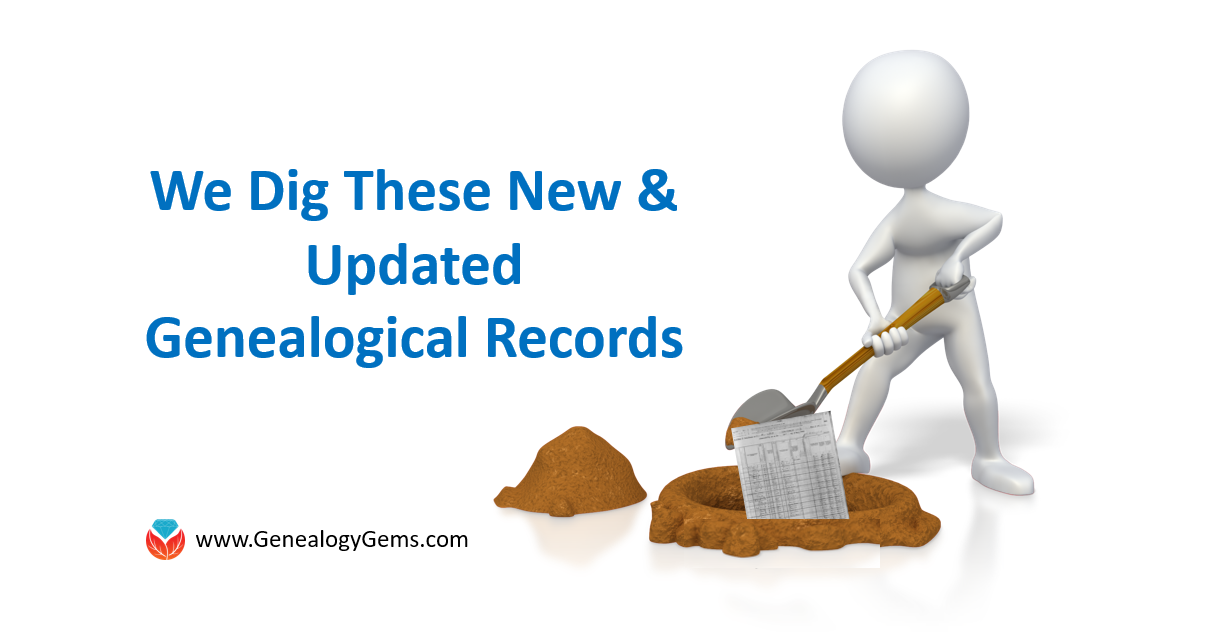
IRELAND – RECORDS, GUIDES, AND BOOKS
The New England Historical and Genealogical Society is offering access to their Irish resources for FREE for a limited time. So hurry before it ends on August 9th and see what luck you have digging up your Irish ancestors.
You will need to sign-up, but remember, it’s free. Once you have logged on, you will begin your search here.
Many Irish researchers have difficulty finding records because of the destruction of the Public Record Office in 1922. Not only can you browse the records available, but also the subject guides and books for Irish genealogy.
UNITED STATES – PENNSYLVANIA – NATURALIZATION RECORDS
The Chester County, Pennsylvania website has made their naturalization indexes available for the year span of 1798-1935. To search their indexes is free, but there is no name search field. You may have to scan several pages to find the record that may interest you. The database is also available to search from Ancestry.com and allows you to search by name, date of event, and place of origin.
The index of naturalizations include the name of the individual, name of native country, and a date. The original record could hold additional information. You can request a copy of the original record from their webpage. To learn more about that, click here.
UNITED STATES – NEVADA – MARRIAGE & DIVORCE
The most difficult records too find are often those that were created within the last 50 years. Due to the scarcity of recent records, we are pleased to see Ancestry has added a new database titled Nevada, Marriage Certificates, 2002-2015. You can search by name, date, location, and spouses name.
The digital image of the marriage records differs from year to year and location to location, but generally, you will find the couples’ names, ages, date and location of the marriage, and the person who officiated the wedding.
Nevada, Divorce Records, 1968-2015 has recently been updated on Ancestry as well. This index includes nearly half a million divorce records. You can use the index to locate the county the divorce took place, and then contact that county for the original records. You won’t find the reason for divorce in this index, but you can find the county of divorce and the divorce file number that will help locate the further records you want.
UNITED STATES – NEBRASKA – PASSENGER LISTS
A passenger list database for Omaha, Nebraska? Yep, but these are passenger and crew lists of air manifests between the years of 1958-1965. The collection is titled Omaha, Nebraska, Passenger and Crew Manifests of Airplanes, 1958-1965. If your Omaha relative did a lot of air travel, these records may be of interest to you. These records were were recorded on a variety of forms turned over to the Immigration and Naturalization Service. Some details included the name of the airline, type of aircraft, flight number, places of departure and arrival, dates of departure and arrival, full name, age, gender, physical description, military rank (if any), occupation, birthplace, citizen of what country, and residence. For military transports, you may even find the next of kin, relationships, and addresses. Later, manifests may include visa or passport numbers.
UNITED STATES – MINNESOTA – PASSENGER LISTS
The same is true in this database, Minnesota, Passenger and Crew Lists, 1957-1962 at Ancestry. This collection includes both air travel and ships coming into Minnesota ports. The original records were originally digitized by the National Archives and Records Administration. Information you may collect from these digital images include:
- Name
- Age
- Gender
- Ethnicity, nationality or last country of permanent residence
- Destination
- Arrival date
- Port of arrival
- Port of departure
- Ship name
UNITED STATES – GEORGIA – BONDS AND LICENSES
Ancestry has added the Savannah, Georgia, Licenses and Bonds, 1837-1909 database this week. You will find digital images of records from the City of Savannah’s Clerk of Council relating to people and businesses. These records usually include the name of person’s name, occupation, name of business, record date, record place, and subject.
UNITED STATES – FREEDMEN RECORDS
FamilySearch has updated two of their existing collections within the Freedmen Bureau Records. The United States, Freedmen’s Bureau Ration Records,1865-1872 and the United States, Freedmen’s Bureau, Records of the Superintendent of Education and of the Division of Education, 1865-1872 have been able to be browsed for some time. While not all the records have been indexed by name for easy searching, many have. You will want to first run a search by your targeted name. You can browse all the digitized images, but it won’t be easy. The ration records are not filed by county, but by film number. However, if you want to browse the collection of education records, they are searchable by state, then date.
MORE GEMS ON IRISH GENEALOGY
Beginning Irish Genealogy: Tips and FREE Records
A Comprehensive Way to Learn How to Research Irish Genealogy
Irish Genealogy: Find Your Poor Ancestors in Ireland
by Lisa Cooke | Aug 1, 2016 | 01 What's New, DNA
“Are unassigned DNA test kits interchangeable? Does Diahan Southard do one-on-one DNA consultations for genealogy?” A listener asks, and we have the answers.
Simona recently wrote in with compliments and two questions for Diahan Southard. Here’s the Q&A, on more resources from Diahan AND whether DNA test kits from Family Tree DNA are interchangeable if they haven’t been use:
Q: “No one, I mean NO one makes DNA easier and more interesting than…your DNA expert Diahan does! I am curious as to what Diahan charges for phone or email consults regarding who to test for what.”
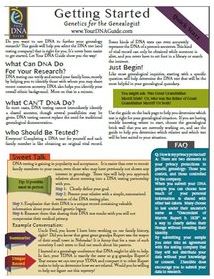 A: Yes, I agree, Diahan Southard, Your DNA Guide and the resident Genealogy Gems genetics expert, is amazing! Diahan answers a lot of those initial question about who to test for what in her handy Getting Started: Genetics for the Genealogist Quick Guide (click to view/purchase). It’s very affordable and can give you inexpensive answers without needing to pay for one-on-one consultation.
A: Yes, I agree, Diahan Southard, Your DNA Guide and the resident Genealogy Gems genetics expert, is amazing! Diahan answers a lot of those initial question about who to test for what in her handy Getting Started: Genetics for the Genealogist Quick Guide (click to view/purchase). It’s very affordable and can give you inexpensive answers without needing to pay for one-on-one consultation.
That said, Diahan does offer DNA consultation services. She also teaches a series of how-to videos that’s, again, much more affordable than a consultation (and much more affordable than taking the wrong test or staring at your results afterward with NO idea what to do with them next). Like Simona says, Diahan demystifies DNA like no else does, and these video tutorials are no exception.
Genealogy Gems listeners get a discount on her video series. A year’s access to is regularly $39.95, but Gems listeners can click on a special link to get it for just $24.95. Click here to learn more.
Q: “I have 5 FamilyTree DNA kits on the counter. Are they all the same kits in the raw? I intended them for a Mtdna test, a Y test and 3 autosomal tests for various family folk. Can I switch tests and persons at this stage?”
A: Diahan says: “Yes, the Family Tree DNA kits she has can be used for any test, provided you correlate everything with the customer service team at FTDNA and get all the kit numbers changed to the appropriate tests.
Diahan Southard is definitely a valuable “GEM” here at Genealogy Gems. Whether you’re just starting to learn about DNA testing for genealogy research, or you’re trying to get the most out of your results, click here to read tons of free DNA how-tos and advice from Diahan. And thanks for sharing this post with your friends and genealogy buddies!This is so, so important as I know of too many women who have mistakenly used their husband’s YDNA kit number and had their sample run, which won’t produce any results. But FTDNA still ran the test, which means you still pay for it. So be EXTRA careful to make sure you have all of your ducks in a row.”
by Lisa Cooke | Jul 23, 2016 | 01 What's New, Findmypast, Records & databases |
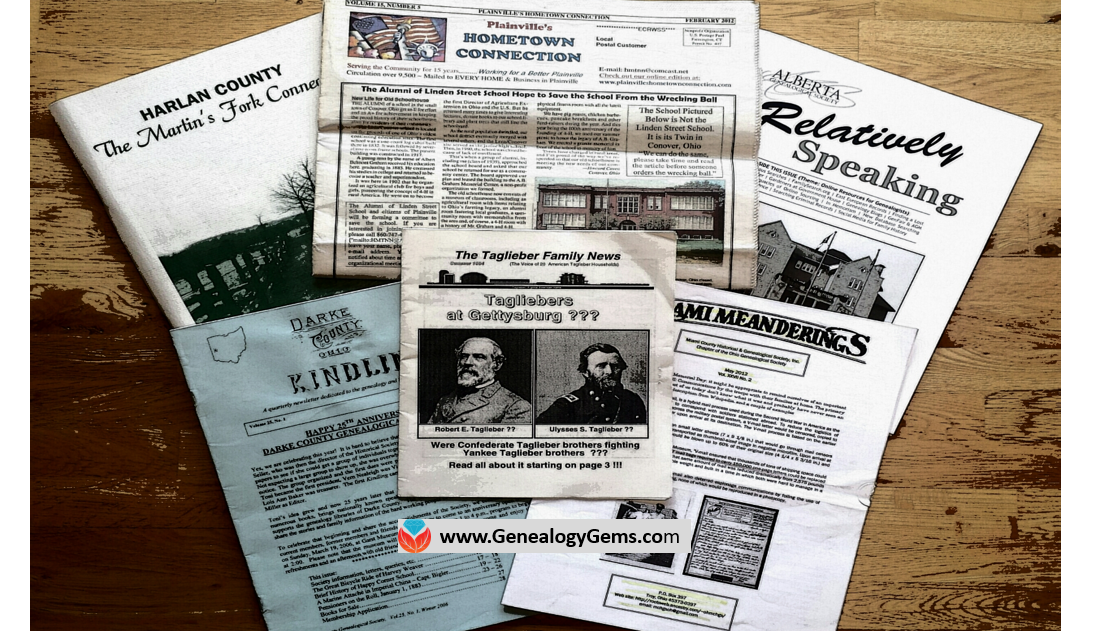
Have you met PERSI? You should! PERSI is the Periodical Source Index. Use PERSI for genealogy and you may discover your ancestors in thousands of articles you never knew existed.
You may have heard me talk in the past about PERSI. In case you haven’t…PERSI is not a person—it’s the acronym for the Periodical Source Index. PERSI is THE master index for periodicals with over 2.7 million entries. Thousands of magazines, newsletters, journals, and other periodicals from the U.S., Canada, Britain, Ireland, and Australia are indexed here.
PERSI is maintained by the Allen County Public Library’s Genealogy Center in Fort Wayne, Indiana. They have the equivalent of 6 full-time staff who are dedicated to subject-indexing every issue of every known genealogy or historical periodical and even the tiniest society newsletter.
Curt Witcher, who runs the Genealogy Center at Allen County and who has been a guest on the podcast in the past, estimates that if you don’t consult periodicals in your research, you could be missing up to 30% of your research leads! That’s a lot of leads! PERSI has long been a staple resource for advanced and professional genealogists to help them break through brick walls. With its help, you can much more quickly locate articles like biographical sketches of ancestors (or people they knew), transcribed indexes to naturalization or probate records, church records, school records, and the like. There might be just-what-you-need histories of places or the organizations your ancestors belonged to.
These key articles are often buried so deep in back issues of little local genealogy newsletters that you may never come across them on your own. Sometimes, they’re what we call “orphaned” content: articles we’d find in totally unexpected places.
HOW TO SEARCH PERSI ONLINE
PERSI used to be searchable on Ancestry, but it isn’t there anymore. The current version of PERSI is exclusively on Findmypast and they’re doing something really cool with it: they are gradually adding digitized articles to the index! They are doing this by signing contracts with each individual society or journal publisher, so it’s not a fast process. The vast majority of entries on PERSI do not have digitized articles linked to them yet. It’s a bonus when you do find them.
To search PERSI at Findmypast you do not actually need a subscription. They allow anyone to search and see the list of results. To see details about specific search results (including any digitized images), you will need a subscription OR you will need to purchase their pay-per-view credits. Findmypast does offer a 14-day free trial. You can also use Findmypast at Family History Centers and at many libraries that have institutional subscriptions.
Once you have located an article, it’s inexpensive to order a copy directly from the Allen County Public Library Genealogy Center. Simply download the order form PDF from their website, fill it out, and mail it in. Last we checked, you can request up to six articles for only $7.50, which you pre-pay and then they bill you separately for copies at 20 cents per page.
Sometime soon, why not take 15 minutes—or your next lunch break at work–and search PERSI for your top surnames and locations? Again, the database is PERSI, it is at Findmypast, and the chance to discover is all yours.
MORE GEMS ON PERSI
PERSI Digitized Collections Gaining Ground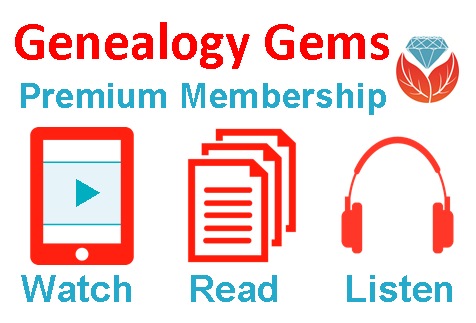
New FindMyPast Hints Help Find Records
The Genealogy Gems Podcast Premium Episode 135: Comparsion of Google Scholar & PERSI (Premium Member Subscription Needed)
by Lisa Cooke | Jul 21, 2016 | 01 What's New, Conferences, FamilySearch
The BYU family history conference is coming up July 26-29, 2016 in Provo, Utah. I’ll be there! Will you? I hope you’ll come say hello.
I hope to meet many of you at Brigham Young University’s annual Conference on Family History and Genealogy in Provo, Utah, coming up on July 26-29, 2016.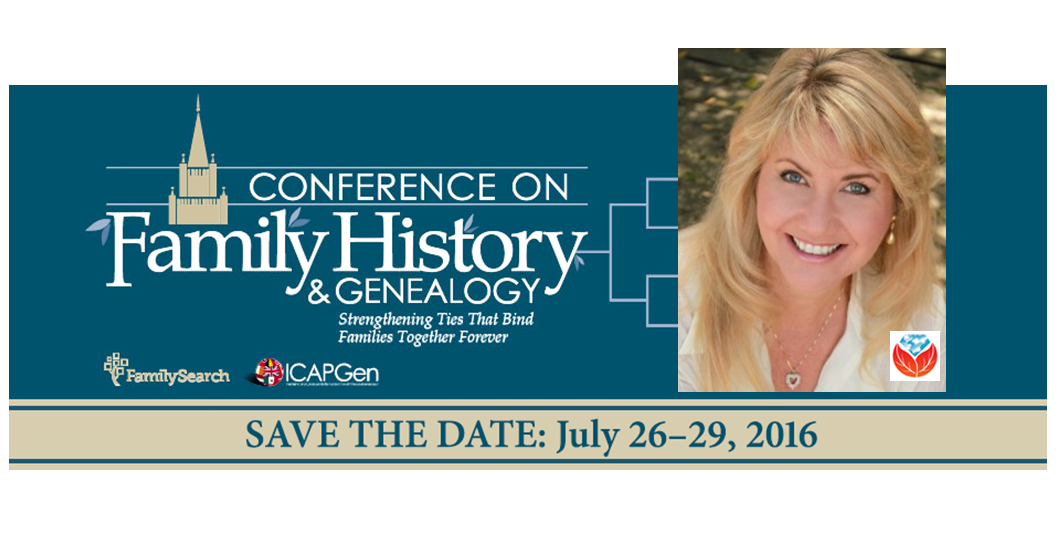 They’re keeping me busy during the first two days of the conference, when I will be teaching five lectures! Those presentations will include:
They’re keeping me busy during the first two days of the conference, when I will be teaching five lectures! Those presentations will include:
- Genealogical Time Travel: Google Earth is Your DeLorean. Get ready to experience old historic maps, genealogical records, images, and videos coming together to create stunning time travel experiences in the free Google Earth program. We’ll incorporate automated changing boundaries, and uncover historic maps that are built right into Google Earth. Tell time travel stories that will truly excite your non-genealogist relatives! You’ve never seen anything like this class!
- Get the Scoop on Your Ancestors with Newspapers. Yearning to “read all about it?” Newspapers are a fantastic source of research leads, information and historical context for your family history. Learn the specialized approach that is required to achieve success in locating the news on your ancestors. Includes 3 Cool Tech Tools that will get you started.
- Google Tools & Procedures for Solving Family History Mysteries. In this session we will put Google to the test. Discover Google tools and the process for using them to solve the genealogical challenges you face. You’ll walk away with exciting new techniques you can use right away.
- Soothe Your Tech Tummy Ache with These 10 Tech Tools. Are you sick and tired of navigating the countless tech tools available to help with your family history? The good news: You don’t need them all to accomplish your genealogy goals. The video session will soothe your suffering by simply focusing on these 10 technology tools that will help you bypass tech overload and get back to your genealogy research.
- Tablet and Smartphone Tricks, Tips and Apps. Tablets and smartphones are built for hitting the road and are ideally suited for genealogy due to their sleek size, gorgeous graphics and myriad of apps and tools. In this class you will discover the top apps and best practices that will make your mobile device a genealogical powerhouse! (iOS and Android)
WHAT: Brigham Young University Conference on Family History & Genealogy
WHEN: July 26-29, 2016
WHERE: BYU Conference Center, 730 East University Pkwy, Provo, UT
REGISTER: Click here for full conference information
Gems editor Sunny Morton will join me at the BYU family history conference in the vendor hall and in the classroom. She’ll be lecturing on researching collateral relatives (as indirect routes to direct ancestors); finding “relatively recent” 20th-century relatives; finding family history in Catholic church records; how to carefully consider your sources; and a hands-on workshop for planning your next family history writing project.
This year’s conference promises to be rich in expertise and education. Keynote speakers include FamilySearch CEO Steve Rockwood and professional genealogist and author, Paul Milner. There are more than 100 classes planned in several topic areas. ICAPGen will host a luncheon, too. A nice extra is that the conference center is so easy to get around in, with free parking right next to the building.
Click here to learn more about the conference and register. And please come say hello to me and Sunny at the Genealogy Gems booth in the exhibit hall on Wednesday or Thursday!
The BYU Family History Conference 2015
Last year, I delivered gave a keynote address on various technologies that help our research. It reminds me how quickly technology moves–and how enthusiastically genealogists continue to embrace new opportunities given them by technology. Click here to read a summary of that talk and whet your appetite for this year’s conference!
by Lisa Cooke | Jul 20, 2016 | 01 What's New, Immigration |
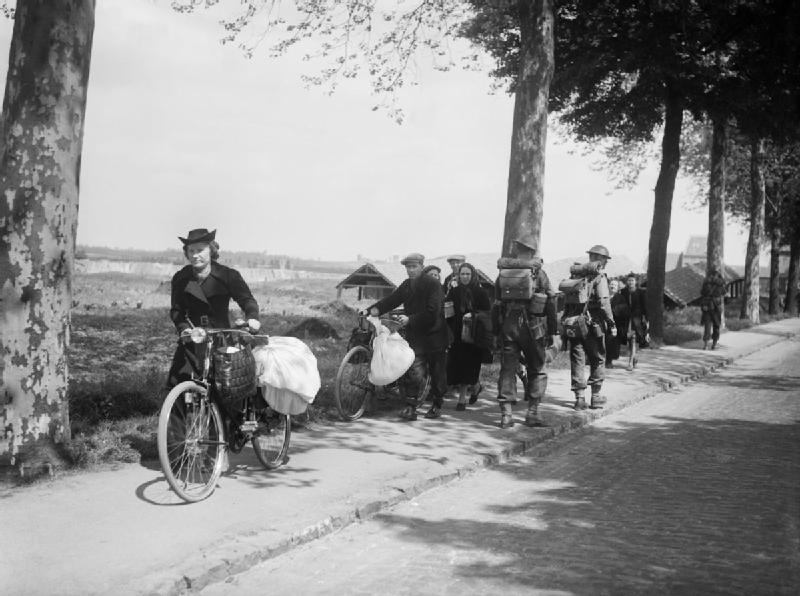
Traveling ancestors created records when they left the country of their origin and when they arrived at their new residence. We often talk about immigration, with an I, but have you researched your ancestors emigration records with an E?
When our ancestors traveled from one place to another, they became two types of migrants. First, they were Emigrants with an E, and then, they were Immigrants with an I. Emigration with an E means someone exiting a country and immigration with an I means someone coming into it. Let’s learn more about emigration…with an E.
I live in a country that doesn’t have much in the way of historical emigration records, but other countries do. I have to remember these emigration records when I start looking overseas for my relatives who were crossing the pond to live here.
EXAMPLES OF EMIGRATION RECORDS
Swedish parishes kept emigration records which are now on Ancestry dating back to 1783. According to the database description, this record set is pretty complete, representing about 75% of those who actually left the country. These rich records can provide place of origin, destination, and the date and place of departure.

For a time, the U.K. also kept outward passenger lists of those leaving the U.K. ports for destinations outside of Europe. The lists include British citizens and those traveling through the U.K. These passenger lists no longer survive for the years before 1890, but they are on Ancestry for the years of 1890-1960. Of course, while writing this post I just had to take a moment to do a bit of searching myself, and that lead to this genealogy gem: my husband’s grandfather, and his parents embarking at Liverpool in 1912!
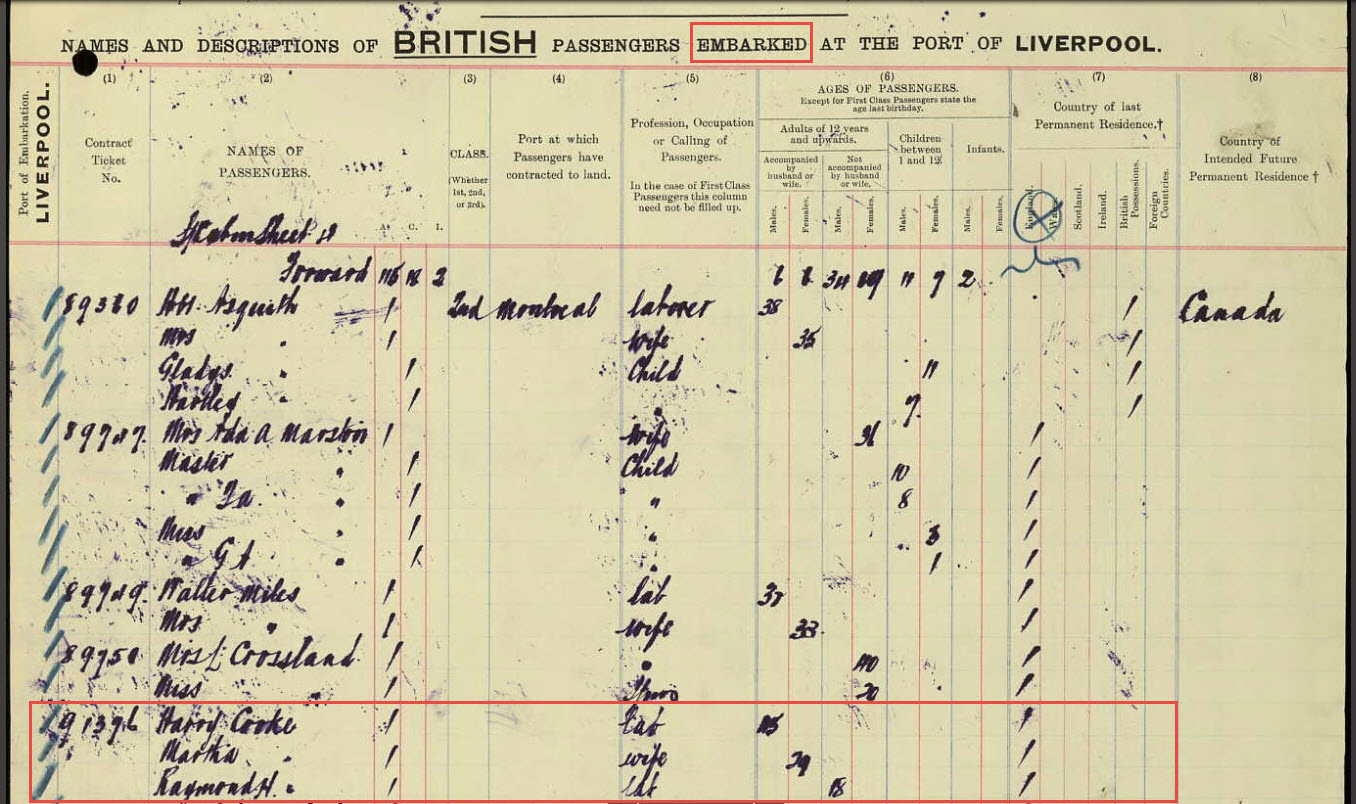
I also spotted this interesting item in the database description. Quoted from the U.K. National Archives website:
“Between 1890 and 1920, among the highest tonnage of ships were leaving British ports bound for North America. Many passengers were emigrants from Britain, Ireland, and Europe. European emigrants bound for America entered the United Kingdom because traveling steerage was less expensive from a British port than from a port in Europe. The shipping companies imposed restrictions on passengers registering; passengers had to have British residency of six weeks to qualify. Many passengers too impatient to qualify for residency changed their names to avoid detection.”
A name change would certainly present a challenge, but it’s very good to know to be on a look out for that situation. This is another example of why it is so important to read the description of the databases you search.
MORE EMIGRATION RECORD COLLECTIONS
A quick search of Ancestry’s card catalog shows emigration collections for Prussia, Switzerland, a few parts of Germany, Jewish refugees from several nations in Europe, and an interesting collection of Dutch emigrants who came to North America with the help of the Canadian and Dutch governments.
Another excellent resource is the FamilySearch Wiki. You can search for the name of the country and the word emigration (with an e) to find out more about your targeted area. I typed in Hungary emigration and found the following information.
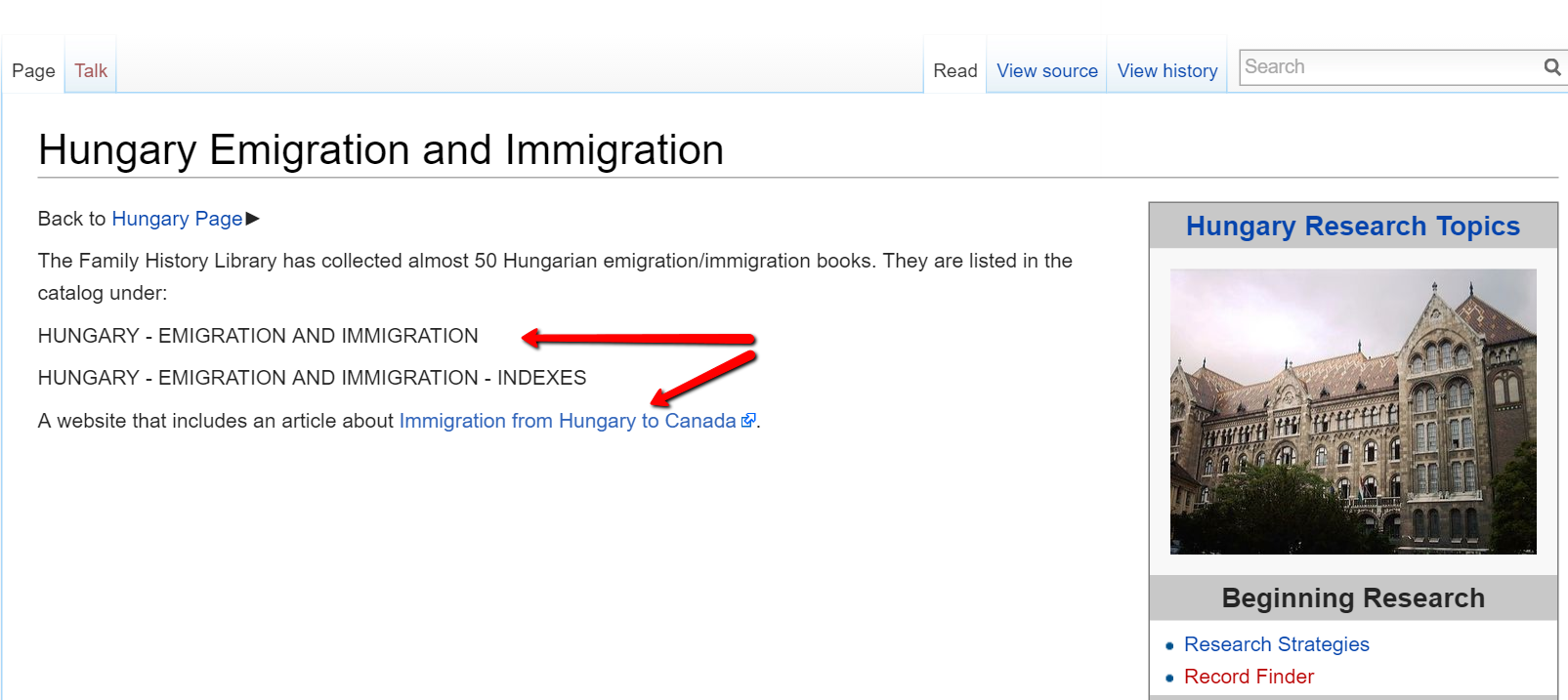
Did your emigrant (or immigrant) ancestor generate records in the country he or she left from as well as the country he or she entered? Remember to check!
MORE GEMS ON IMMIGRATION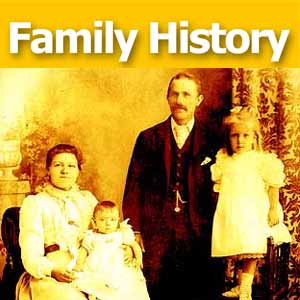






 They’re keeping me busy during the first two days of the conference, when I will be teaching five lectures! Those presentations will include:
They’re keeping me busy during the first two days of the conference, when I will be teaching five lectures! Those presentations will include:







